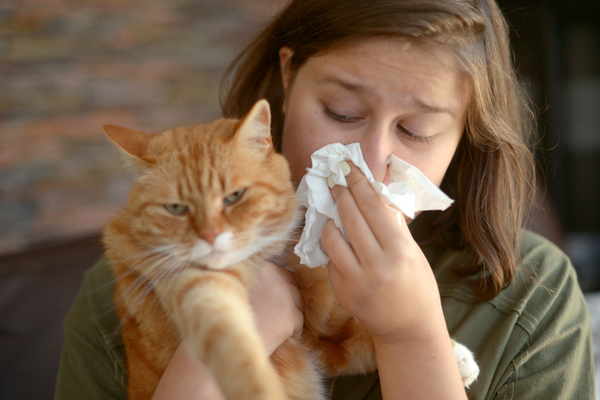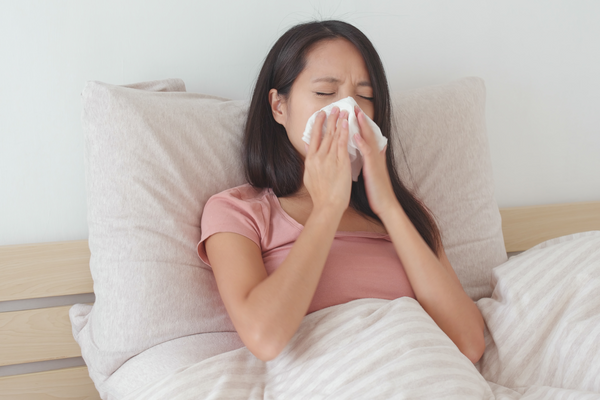Eczema and Allergies – Can They Be Linked?

Eczema can look and feel different for everyone. Generally, this chronic skin condition makes the skin dry, red, itchy, inflamed, and cracked. The most common type of eczema is atopic dermatitis, which is often triggered by food or environmental allergens. Also known as allergic eczema or atopic eczema, the condition affects more than 9.6 million children and 16.5 million adults in the United States. Scientists are still studying the link between eczema, allergies, and asthma. However, numerous studies have shown that if one or both parents have eczema, allergies, or asthma, their child is more likely to have eczema – and that children with eczema may be more at risk for developing allergies or asthma.
While these conditions are common, both eczema and allergies can take a physical and emotional toll. Understanding the link between eczema and allergies can help you manage symptoms, find relief, and ultimately improve your quality of life. Read on to learn more.
The Connection Between Eczema and Allergies
Doctors used to think that eczema was just a sign of an allergic reaction––the body overreacting to a harmless allergen like dust mites, molds, or animal dander. Now, most experts agree that eczema is actually a condition affecting the outer layer of skin. Still, eczema often develops in connection with other conditions, such as allergies and asthma.
Like allergies, eczema can be caused by an overreaction of the immune system. When an otherwise harmless substance (cat dander, for example) comes into contact with the body, the immune system may overreact and release histamines to combat it––resulting in itching, redness, inflammation, and other eczema-related symptoms.
Atopic dermatitis typically begins in childhood, usually within the first six months of an infant’s life. While it’s a common form of eczema, it can be severe and long-lasting. Those with allergic eczema often experience symptoms of both eczema and allergies; the reaction may not occur until 48-96 hours after exposure to the triggering allergen.
According to the Allergy & Asthma Network, some people have a genetic condition associated with a skin protein called filaggrin that causes their skin to lose moisture and allows allergens and bacteria to enter the skin more easily, triggering eczema flare-ups.
Tips to Prevent Flare-Ups
There is no cure for eczema, but there are treatments and effective ways to help prevent flare-ups. Along with following your doctor’s guidance, try these tips to prevent flare-ups and find relief from eczema and allergies:
Consult an allergist.
If you experience allergy symptoms and eczema but aren’t quite sure what you’re allergic to, consider consulting an allergist. If you can pinpoint specific triggers, you can make a plan to avoid them. Your doctor can also help create a treatment and management plan that will work for you.
Avoid things that irritate your skin.
Common triggers include wool, harsh cleaning products, perfume, fragranced soaps and laundry detergents (always opt for hypoallergenic laundry detergent). Heavy or tight clothing can also cause symptoms; natural fiber clothing, such as cotton, is usually the most comfortable.
Use a gentle moisturizer.
One of the best ways to ease the uncomfortable symptoms of eczema–dry, red, inflamed, itchy skin–is to keep skin moisturized by applying a fragrance-free moisturizer at least twice daily. Keep in mind that you may need to try a few products before finding one that works best for you. Check out the National Eczema Association’s guide on controlling eczema by moisturizing here.
Avoid food allergens.
Food allergies can trigger eczema symptoms. In fact, up to 30% of those with eczema develop an immediate reaction to food. The foods that most often cause skin reactions are the most common food allergens, including milk, egg, soy, peanuts, soy nuts, wheat, fish, shellfish, and sesame. Your allergist can help determine which foods are linked with your eczema symptoms.
Take warm, soothing baths.
Taking a lukewarm bath or shower can help soothe itchy skin and help prevent bacterial infections; just make sure to avoid hot baths, as too much heat can further irritate eczema-prone skin. After your bath, gently pat your skin dry and immediately apply your go-to moisturizer or cream.
Try your best to avoid scratching.
As with most skin conditions, scratching can exacerbate eczema symptoms. Excessive scratching can also lead to skin infections, bleeding, and oozing. Keep fingernails short and keep affected areas moisturized and covered to help prevent the temptation to scratch.
Reduce allergens in your home.
Those with eczema and allergies can find relief by reducing allergens like dust mites, pet dander, and mold inside the home. Here are a few simple ways to eliminate or reduce common allergens:
- Vacuum carpets, upholstery, pillows, and other soft surfaces at least twice weekly with a HEPA-type vacuum to remove dirt buildup, allergens, and other contaminants. After vacuuming, spray soft surfaces with The Ecology Works Anti-Allergen Solution to neutralize common indoor allergens on contact.
- Bathe pets regularly with The Ecology Works Anti-Allergen Pet Shampoo to remove allergens (including pet dander and dust mites) from their fur.
- Frequently dust surfaces around the home with a microfiber cloth dampened with the Anti-Allergen Solution.
- Use The Ecology Works Anti-Allergen Laundry Detergent to neutralize allergens in clothing, bedding, washable rugs, towels, pet beds, and more. This hypoallergenic detergent is recommended by allergists and dermatologists and will leave nothing behind to irritate sensitive skin.
- Use a HEPA filter to catch larger airborne allergens and prevent them from circulating throughout your home.
- Prevent mold growth in the home by addressing leaks, keeping humidity in your home below 50%, using an exhaust fan in the kitchen and bathroom, and using a mold inhibitor, like Vital Oxide, to clean mold-prone areas like the corners of the bathtub, the washing machine, around the kitchen sink, etc.
Have questions about cleaning or reducing allergens inside your home or business? We have answers! The Ecology Works has been helping folks with allergies and asthma since 1993. We can help you select the products you need to live a better, allergen-free life. Please feel free to Contact Us or message us on Facebook. No question is too small! We're here to help.






